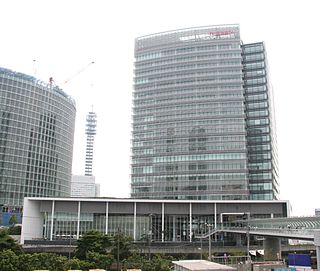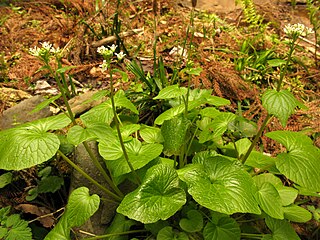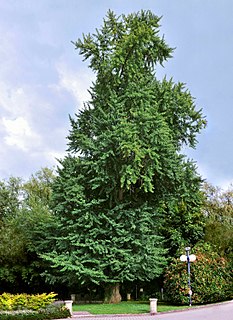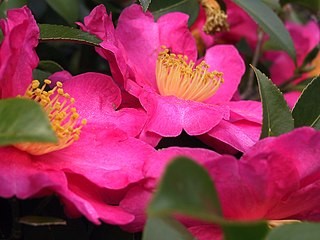
Alder is the common name of a genus of flowering plants, Alnus, belonging to the birch family Betulaceae. The genus comprises about 35 species of monoecious trees and shrubs, a few reaching a large size, distributed throughout the north temperate zone with a few species extending into Central America, as well as the northern and southern Andes.

The Nissan Motor Company, Ltd., trading as the Nissan Motor Corporation and often shortened to Nissan, is a Japanese multinational automobile manufacturer headquartered in Nishi-ku, Yokohama, Japan. The company sells its cars under the Nissan, Infiniti, and Datsun brands with in-house performance tuning products labelled Nismo. The company traces its name to the Nissan zaibatsu, now called Nissan Group.

Wasabi or Japanese horseradish is a plant of the family Brassicaceae, which also includes horseradish and mustard in other genera. A paste made from its ground rhizomes is used as a pungent condiment for sushi and other foods. It is similar in taste to hot mustard or horseradish rather than chili peppers in that it stimulates the nose more than the tongue. Most wasabi flavoring in commerce is, however, ersatz, based on horseradish and food coloring.

Reynoutria japonica, synonyms Fallopia japonica and Polygonum cuspidatum, is a species of herbaceous perennial plant of the knotweed and buckwheat family Polygonaceae. It is commonly known as Asian knotweed or Japanese knotweed. It is native to East Asia in Japan, China and Korea. In North America and Europe, the species has successfully established itself in numerous habitats, and is classified as a pest and invasive species in several countries.

Kawasaki Heavy Industries Ltd. (KHI) is a Japanese public multinational corporation primarily known as a manufacturer of motorcycles, engines, heavy equipment, aerospace and defense equipment, rolling stock and ships. It is also active in the production of industrial robots, gas turbines, boilers and other industrial products. The company is named after its founder Shōzō Kawasaki, and has dual headquarters in Chūō, Kobe and Minato, Tokyo.

Ginkgo biloba, commonly known as ginkgo or gingko, also known as the maidenhair tree, is the only living species in the division Ginkgophyta, all others being extinct. It is a member of a very old genus, with some fossils dating back 200 million years. Native to China, the tree is widely cultivated, and was cultivated early in human history. It has various uses in traditional medicine and as a source of food.

Camellia is a genus of flowering plants in the family Theaceae. They are found in eastern and southern Asia, from the Himalayas east to Japan and Indonesia. There are 100–300 described species, with some controversy over the exact number. There are also around 3,000 hybrids. The genus was named by Linnaeus after the Jesuit botanist Georg Joseph Kamel, who worked in the Philippines and described a species of camellia. Camellias are famous throughout East Asia; they are known as cháhuā in Chinese, tsubaki (椿) in Japanese, dongbaek-kkot (동백꽃) in Korean, and as hoa trà or hoa chè in Vietnamese.

Bonsai is a Japanese art form which utilizes cultivation techniques to produce, in containers, small trees that mimic the shape and scale of full size trees. Similar practices exist in other cultures, including the Chinese tradition of penzai or penjing from which the art originated, and the miniature living landscapes of Vietnamese Hòn non bộ. The Japanese tradition dates back over a thousand years.

Mitsubishi Motors Corporation is a Japanese multinational automotive manufacturer headquartered in Minato, Tokyo, Japan. In 2011, Mitsubishi Motors was the sixth-largest Japanese automaker and the nineteenth-largest worldwide by production. From October 2016 onwards, Mitsubishi has been one-third (34%) owned by Nissan, and thus a part of the Renault–Nissan–Mitsubishi Alliance.

Chrysanthemums, sometimes called mums or chrysanths, are flowering plants of the genus Chrysanthemum in the family Asteraceae. They are native to East Asia and northeastern Europe. Most species originate from East Asia and the center of diversity is in China. Countless horticultural varieties and cultivars exist.

A cherry blossom is a flower of many trees of genus Prunus. The most well-known species is the Japanese cherry, Prunus serrulata, which is commonly called sakura.

Cryptomeria is a monotypic genus of conifer in the cypress family Cupressaceae, formerly belonging to the family Taxodiaceae. It includes only one species, Cryptomeria japonica. It used to be considered by some to be endemic to Japan, where it is known as Sugi. The tree is called Japanese cedar or Japanese redwood in English.

Tokyo Electric Power Company Holdings, Incorporated, also known as Toden or TEPCO, is a Japanese electric utility holding company servicing Japan's Kantō region, Yamanashi Prefecture, and the eastern portion of Shizuoka Prefecture. This area includes Tokyo. Its headquarters are located in Uchisaiwaicho, Chiyoda, Tokyo, and international branch offices exist in Washington, D.C., and London. It is a founding member of strategic consortiums related to energy innovation and research; such as JINED, INCJ and MAI.

Energy in Japan refers to energy and electricity production, consumption, import and export in Japan. The country's primary energy consumption was 477.6 Mtoe in 2011, a decrease of 5% over the previous year.

The Fukushima Daiichi Nuclear Power Plant is a disabled nuclear power plant located on a 3.5-square-kilometre (860-acre) site in the towns of Ōkuma and Futaba in Fukushima Prefecture, Japan. The plant suffered major damage from the magnitude 9.0 earthquake and tsunami that hit Japan on March 11, 2011. The chain of events caused radiation leaks and permanently damaged several reactors, making them impossible to restart. By political decision, the remaining reactors were not restarted.

Sharp Corporation is a Japanese multinational corporation that designs and manufactures electronic products, headquartered in Sakai-ku, Sakai, Osaka Prefecture. Since 2016 it has been majority owned by the Taiwan-based Foxconn Group. Sharp employs more than 50,000 people worldwide. The company was founded in September 1912 in Tokyo and takes its name from one of its founder's first inventions, the Ever-Sharp mechanical pencil, which was invented by Tokuji Hayakawa in 1915.

Monuments is a collective term used by the Japanese government's Law for the Protection of Cultural Properties to denote Cultural Properties of Japan as historic locations such as shell mounds, ancient tombs, sites of palaces, sites of forts or castles, monumental dwelling houses and other sites of high historical or scientific value; gardens, bridges, gorges, mountains, and other places of great scenic beauty; and natural features such as animals, plants, and geological or mineral formations of high scientific value.

The 2011 earthquake off the Pacific coast of Tōhoku was a magnitude 9.0–9.1 (Mw) undersea megathrust earthquake off the coast of Japan that occurred at 14:46 JST on Friday 11 March 2011, with the epicenter approximately 70 kilometers (43 mi) east of the Oshika Peninsula of Tōhoku and the hypocenter at an underwater depth of approximately 29 km (18 mi).

The Fukushima Daiichi nuclear disaster was a 2011 nuclear accident at the Fukushima Daiichi Nuclear Power Plant in Ōkuma, Fukushima Prefecture, Japan. The event was caused by the 2011 Tōhoku earthquake and tsunami. It was the most severe nuclear accident since the Chernobyl disaster in 1986. It was classified as Level 7 on the International Nuclear Event Scale, after initially being classified as Level 5, making it the only other accident to receive a Level 7 classification. While the explosion at the Mayak facility was the second worst incident by radioactivity released, the INES ranks by impact on population, so Chernobyl and Fukushima rank higher than the 10,000 evacuated from the classified restricted Mayak site in rural Siberia.


















